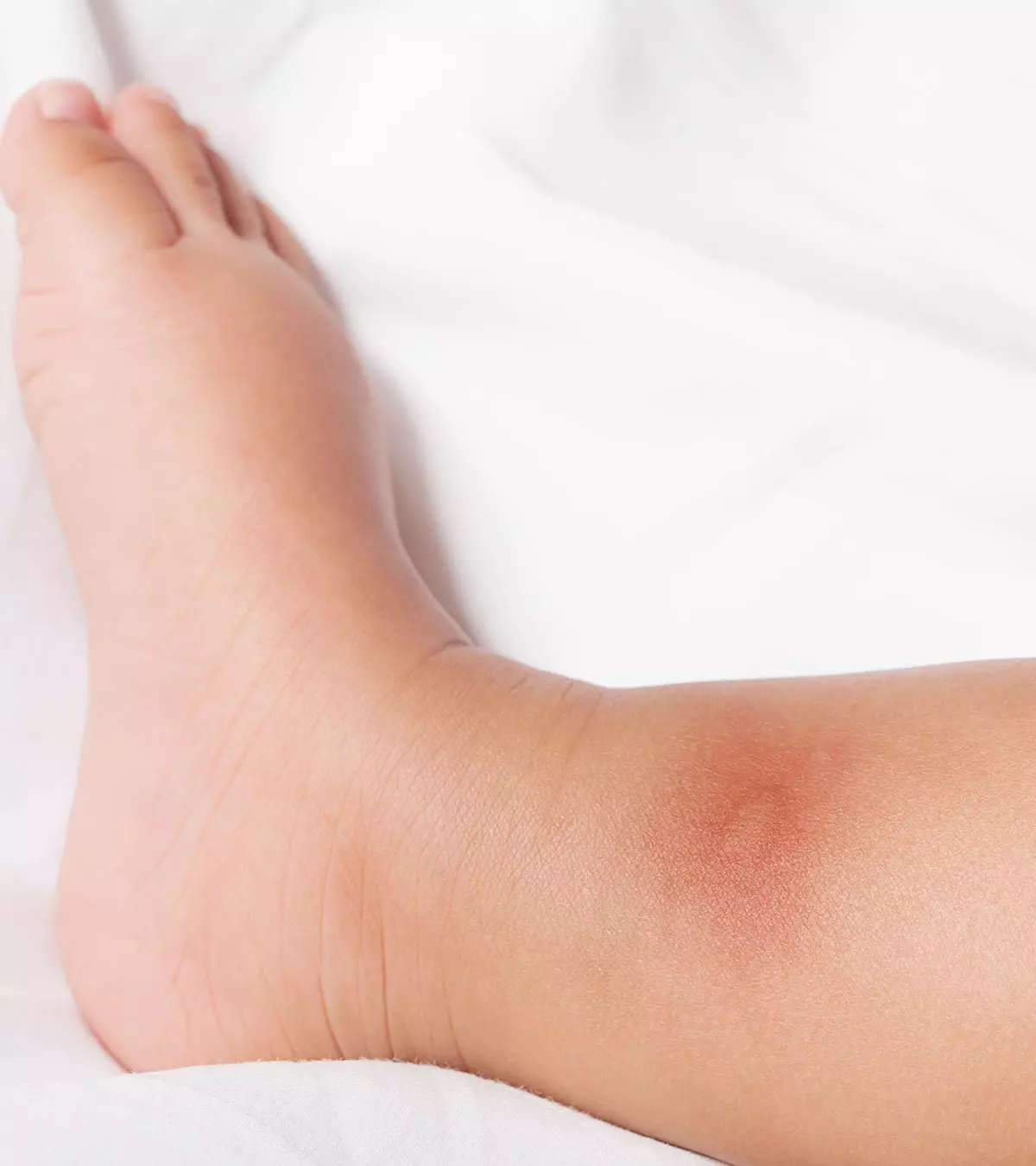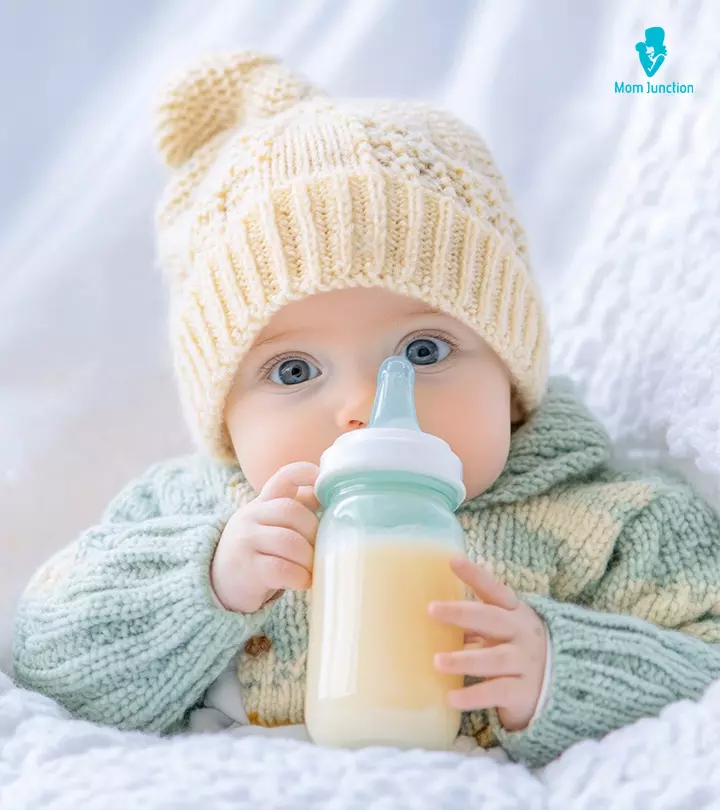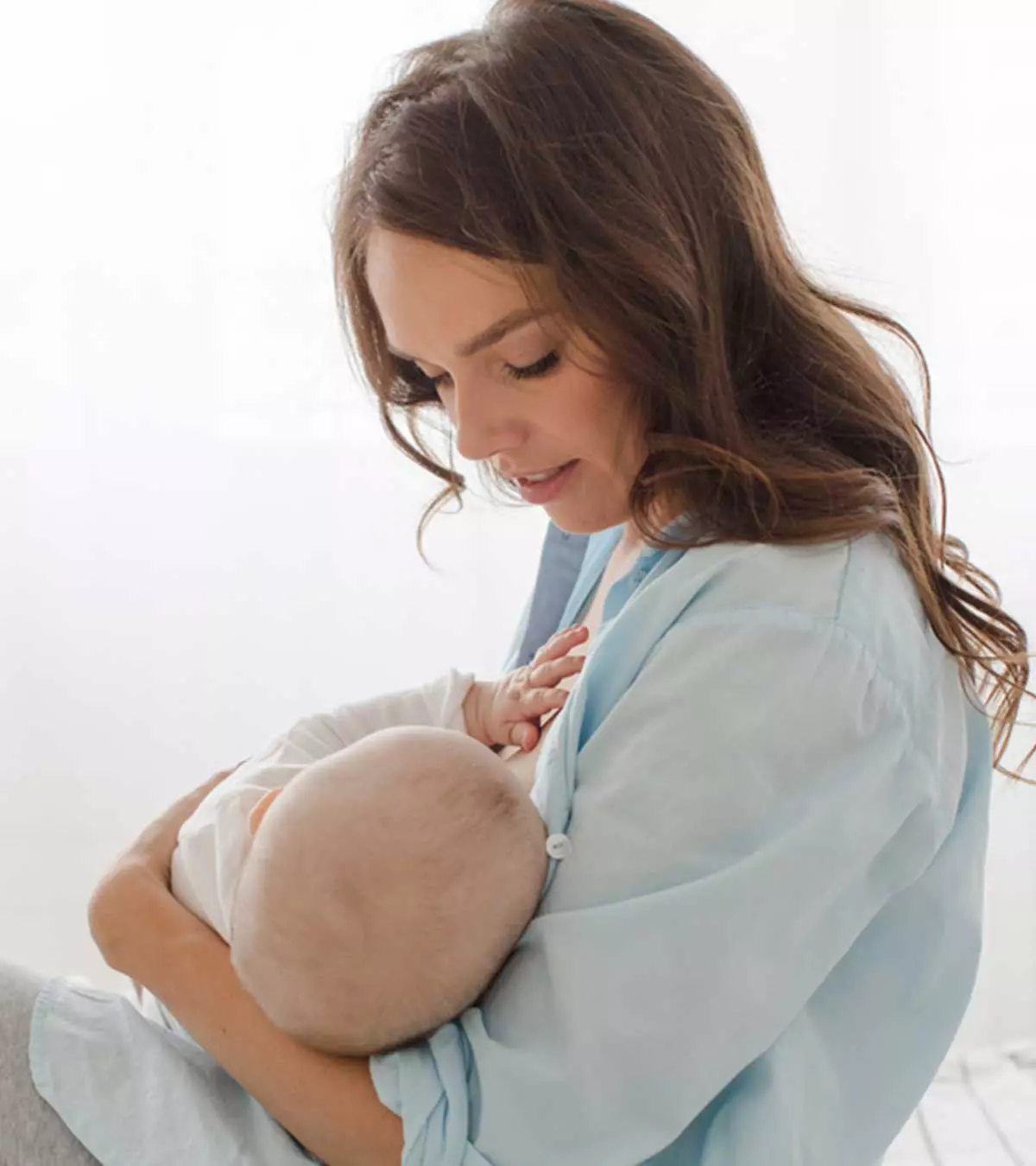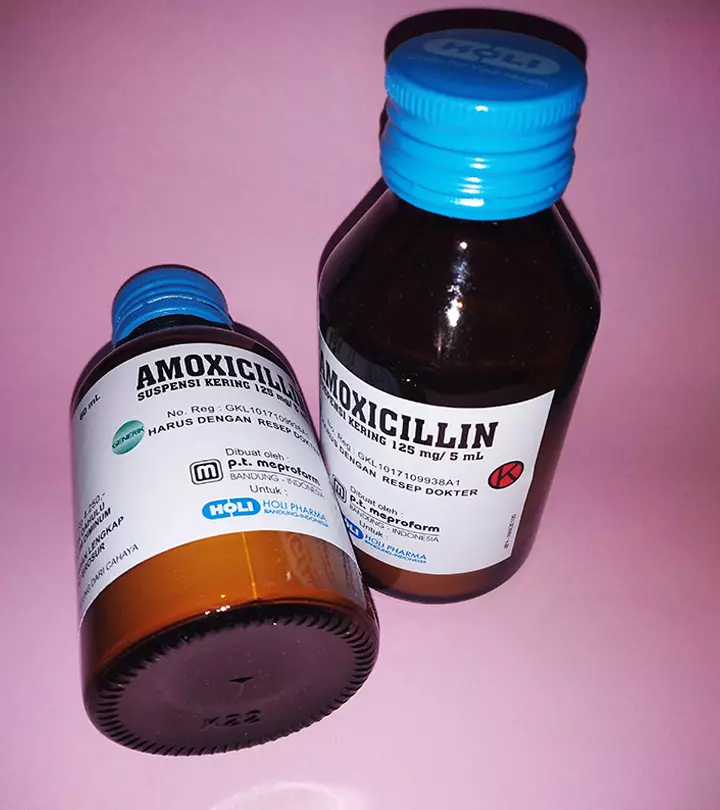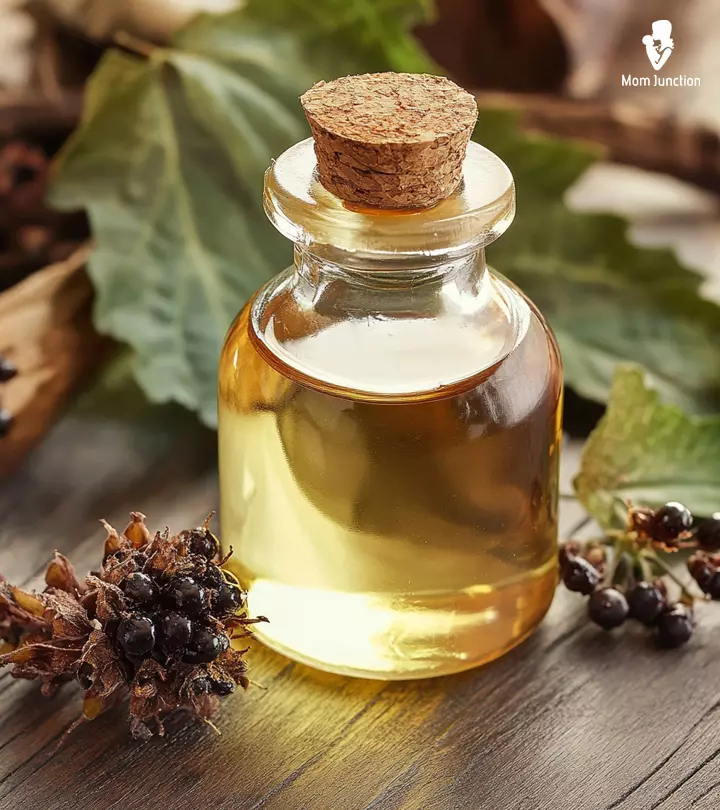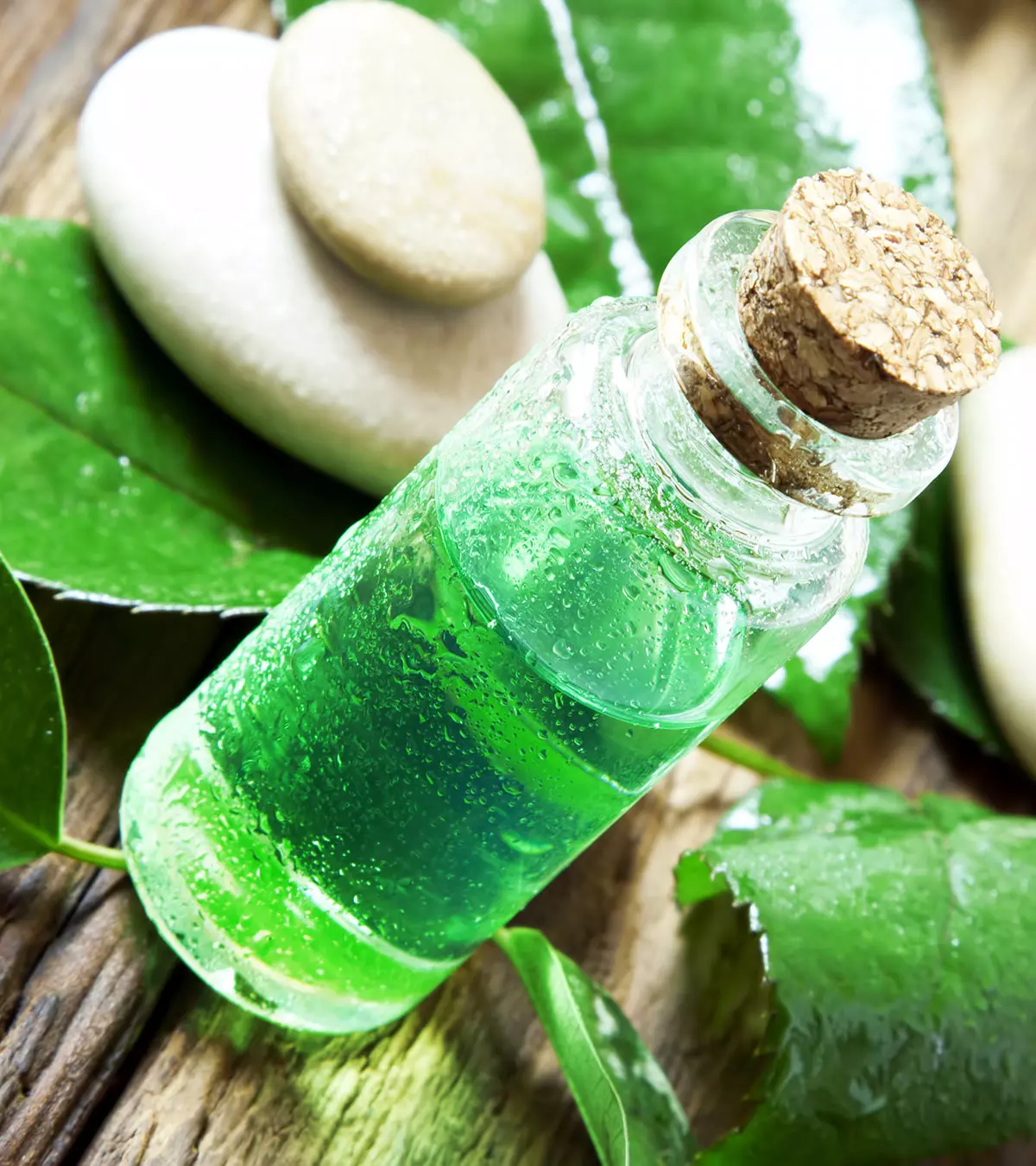
Image: Shutterstock
While the use of essential oils in adults has gained popularity, you may wonder about the safety of tea tree oil for babies. Tea tree oil is known for its antibacterial, insecticidal, antiviral, and immunity-stimulant properties (1) (2). It is also present in many over-the-counter creams, lotions, and ointments. Diluted tea tree oil is also used for massaging purposes. Read this post to know more about the safety, benefits, side effects, and precautions of using tea tree oil for babies.
Key Pointers
- Tea tree oil has many benefits, including antibacterial, insecticidal, antiviral, and immunity-stimulating effects.
- Research has not conclusively proven its safety for use in babies.
- When using tea tree oil on babies, it is important to dilute it with carrier oil, perform a patch test, and avoid sensitive areas.
- Tea tree oil may relieve various conditions such as warts, fungal infections, head lice, and scabies.
- It is advisable to consult a doctor before using tea tree oil as a baby wipe, surface cleaner, or insect repellent.
Is Tea Tree Oil Safe For Babies?
There is limited research on the safety of tea tree oil for babies. Tea tree oil is likely one of the few essential oils safe for babies. However, no further conclusive evidence proves tea tree oil’s safety. It is, therefore, necessary to observe precautions before considering the regular use of tea tree oil for babies.
Precautions For Using Tea Tree Oil For Babies And Toddlers
Note the following points when planning to use tea tree oil for babies and toddlers:
- The use of tea tree oil should only be topical. It could be poisonous when ingested (3). Its use in humidifiers or for inhalation should be avoided since the aroma may sting and come across as uncomfortable for babies.
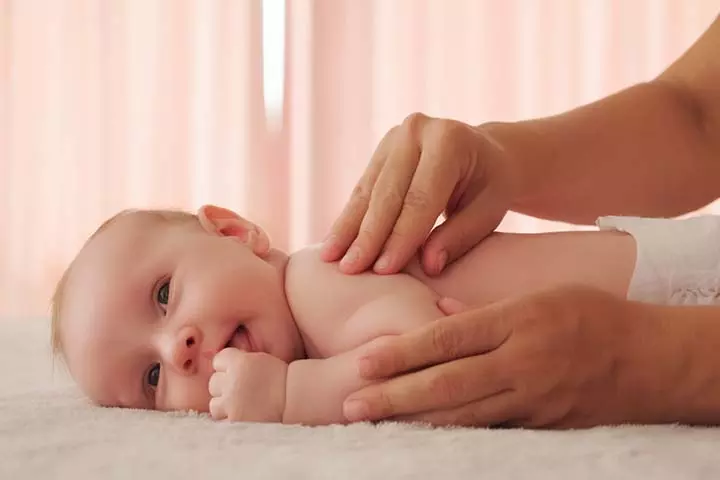
- Dilute tea tree oil with a carrier oil, such as sweet almond oil, grapeseed, and jojoba oil, since undiluted tea tree oil may cause skin irritation (4).
- Perform a patch test before using the oil on a large area of skin. Apply the mixture of carrier oil and tea tree oil to a small part of the baby’s skin and wait for a day or two to see the signs of allergy like rashes and redness.
- Do not use tea tree oil around sensitive areas like eyes, genitals, and near the mouth.
- The US Food and Drug Administration (FDA) classifies essential oils as ‘food supplements’ and not drugs. The manufacturers of tea tree oil cannot market or sell it as a medicine (5). Therefore, do not consider tea tree oil for the treatment of an ailment. If the baby is unwell, then see a doctor.
Benefits Of Tea Tree Oil For Babies
A few studies and anecdotal evidence have found tea tree oil useful in providing relief from the following conditions.
- Warts: Tea tree oil has antiviral properties. A study noted that it could be effective in treating warts caused by the human papillomavirus (HPV) in babies (6). It is not known if tea tree oil is effective in fighting other viruses causing warts.
- Fungal infections: Some studies have found that tea tree oil might help treat fungal infections of the skin (7). Research has noted that it may have antifungal properties comparable to a few antifungal medicines.

- Head lice: Anecdotal evidence shows that tea tree oil is often used for removing head lice (8).
- Wound healing: A few studies have noted the anti-inflammatory and antibacterial properties of tea tree oil on wound healing (9). It is not clearly known whether tea tree oil was applied diluted in oil or a carrier medicine. It is not advisable to apply oil or any other compound directly to wounds.
 Health fact
Health fact- Scabies: Tea tree oil in diluted forms might be effective in treating scabies (10).
- Baby wipe: You might consider adding a drop of tea tree oil in warm water to use it for wiping the baby after they soiled. Anecdotal evidence suggests that tea tree oil might help eliminate foul smell and microbes.
- Surface cleaner: The antimicrobial properties of tea tree oil also make it a natural surface cleaner for a baby’s room. Dilute tea tree oil with warm water and use it to clean surfaces, like shelves, cribs, and other objects in the baby’s room. Do not clean toys since the baby is likely to place them in their mouth.
- Insect repellent: Anecdotal evidence suggests that tea tree oil might work as an insect repellent. You can soak a cotton ball in tea tree oil and place it in a corner of the baby’s room to repel mosquitoes. Keep the cotton ball away from the little one’s reach.
Tea tree oil can also be a good remedy for treating ear-related infections. However, make sure to use small amounts of diluted tea tree oil for a short period under medical guidance (11).
Sree, a new mom, shares a home remedy she used to treat her baby’s earache associated with a cold. She says, “Mix two drops of tea tree and almond oil and clear the ear with an earbud tip; it works for infections. Try not to poke it deep inside (i).”
 Quick tip
Quick tip
Do note that tea tree oil is not a medicine for the above conditions. It is important to consult a doctor if the baby has any of these complaints.
If your doctor is okay with you using tea tree oil, then you may go ahead.
How To Use Tea Tree Oil For A Baby?
Observe the following points while choosing and using tea tree oil for babies and toddlers.
- Buy good quality tea tree oil. Check for the presence of any additives and preservatives.
- Add one to three drops of tea tree oil to one ounce (30ml) of carrier oil like jojoba, argan, coconut, avocado, or almond oil (12).
- Apply the oil on a small patch of skin and wait for a day to see if the skin shows any reaction. If there is no reaction, then apply the tea tree oil and carrier oil mixture to the affected part.

- There is no fixed duration for application. You may apply once or twice a day for a week. If the condition does not show any improvement, then consult a doctor. If any redness or rash occurs or the baby’s condition worsens, discontinue using it immediately and consult a doctor.
 Caution
CautionSide Effects Of Tea Tree Oil On Babies

While tea tree oil has numerous benefits, it can also cause side effects, making it essential to perform a patch test before extensive use.
Studies show that about 5% of users of tea tree oil develop some intensity of allergic dermatitis (eczema) due to topical use (13). If your baby already has skin problems, then do not use tea tree oil.
A few cases of gynecomastia – abnormal growth of breasts – have been reported following the use of tea tree oil and lavender oil (6) (14).
Frequently Asked Questions
1. Is tea tree oil good for baby eczema?
There is no definitive evidence that tea tree oil can improve eczema symptoms. (15). Some studies suggest that tea tree oil may lead to allergic contact dermatitis (13). Speak to a pediatrician or an alternative medicine expert before using tea tree oil for your baby’s eczema.
2. Can I use tea tree oil on my baby’s scalp?
Experts usually recommend avoiding using essential oils, such as tea tree oil for kids younger than two years every day (16). Speak to your doctor if you still wish to use tea tree oil on your baby’s scalp for general skin and hair care purposes.
3. Is it safe to diffuse tea tree oil around babies?
There is anecdotal evidence suggesting that you may use tea tree oil for diffusion in babies older than six months. However, be careful and don’t diffuse the essential oil near the baby. Speak to an aromatherapy expert to know the correct dilution ratio for diffusion. Diffuse tea tree oil in a well-ventilated room for short durations only. According to the Johns Hopkins Medicine, essential oil diffusers should be avoided in small households (17).
4. Is tea tree oil good for my baby’s cradle cap?
Cradle cap is a form of seborrheic dermatitis (SD). Research has shown shampoos with tea tree oil to be effective for managing SD in adults. Therefore, it is possible that tea tree oil might help manage cradle cap in infants, but it is crucial to get your doctor’s approval before using tea tree or any other essential oils for baby’s skin (18).
5. Does tea tree oil help fight congestion in babies?
Tea tree oil is known to help manage the symptoms of respiratory infections such as bronchitis or influenza in adults (19). However, there is no established medical evidence to show that it is safe and beneficial for a baby’s respiratory health. Therefore, it is vital to consult a doctor before using any essential oils for babies.
Tea tree oil for babies is one of the essential oils with anti-inflammatory properties and several therapeutic benefits. The oil may be used for different conditions and purposes, including the treatment of warts and scabies and providing cold sore relief to babies. However, given the possibility of side effects of tea tree oil for babies, follow the necessary precautions, such as sticking to only topical application and checking for allergies after a baby massage. It is important that you consult your child’s doctor before using any ointment or oil to know its right application and avoid adverse reactions.
Infographic: Precautions For Using Tea Tree Oil For Babies And Toddlers
The use of essential oils has become comparatively popular in recent years. But one should note that these oils should be used cautiously, especially when applying them on babies. In the following infographic, we have listed a few important points you should remember when using tea tree oil for your baby. Read on to know more. Illustration: Momjunction Design Team
Illustration: Benefits And Uses Of Tea Tree Oil For Babies
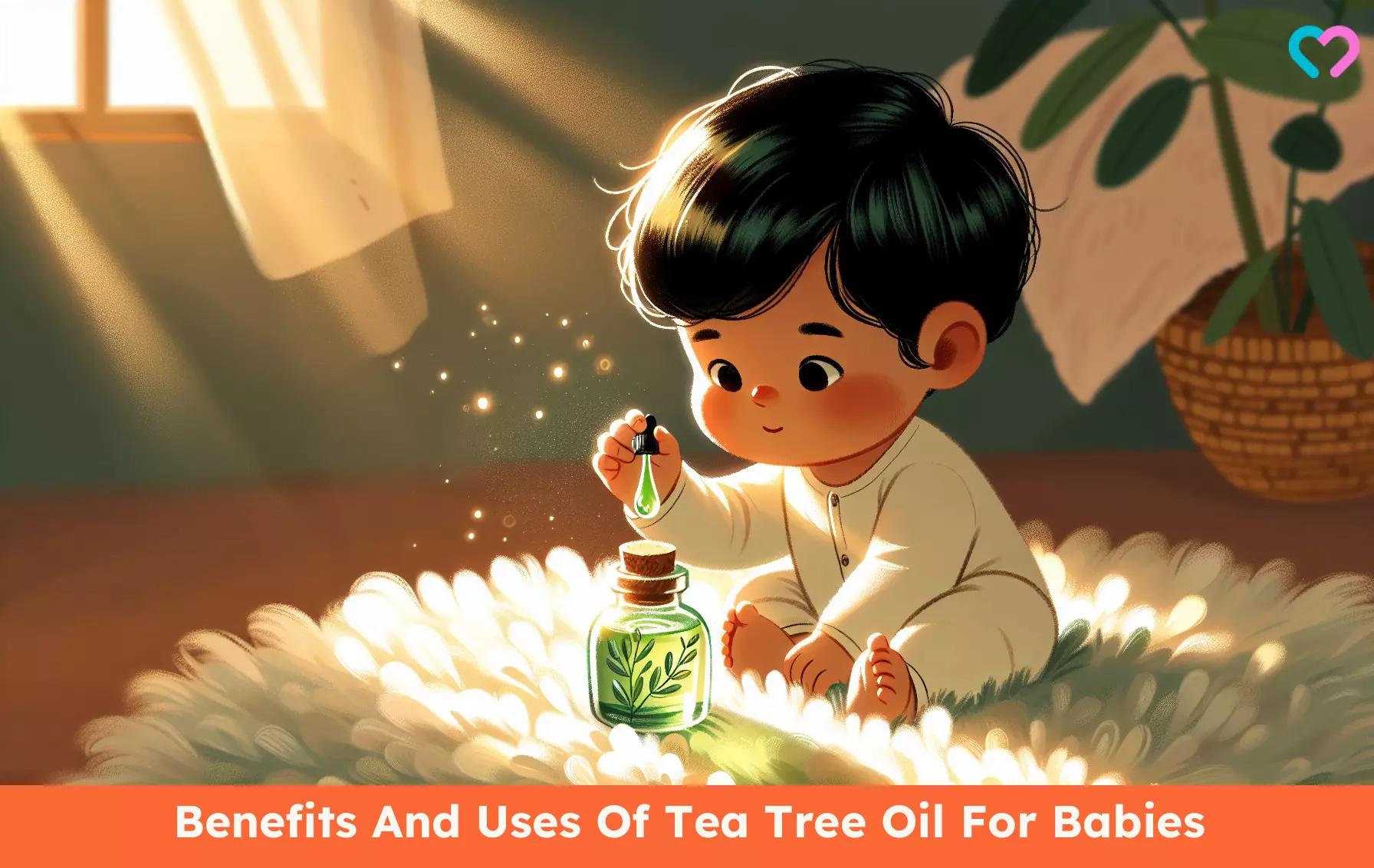
Image: Dall·E/MomJunction Design Team
Are you wondering if it’s safe to use essential oils around or on your baby? Watch this video to find out!
Personal Experience: Source
MomJunction articles include first-hand experiences to provide you with better insights through real-life narratives. Here are the sources of personal accounts referenced in this article.
i. Cold;https://sree-firststeps.blogspot.com/2009/09/cold.html
References
1. Christine F. Carson, Brian J. Mee, and Thomas V. Riley Mechanism of Action of Melaleuca alternifolia (Tea Tree) Oil on Staphylococcus aureus determined by Time-Kill, Lysis, Leakage, and Salt Tolerance Assays and Electron Microscopy; American Society for Microbiology
2. Babar Ali et al., Essential oils used in aromatherapy: A systemic review; Asian Pacific Journal of Tropical Biomedicine.
3. Tea Tree Oil Remedy and Poison; National Capital Poison Control.
4. Opinion on tea tree oil; Scientific Committee on Consumer Products, The European Commission.
5. Mick Patrick, A Doctor’s Take on Essential Oils; Nationwide Children’s
6. Millar B.C. and Moore J.E., Successful topical treatment of hand warts in a paediatric patient with tea tree oil (Melaleuca alternifolia); National Center for Biotechnology Information
7. Diane C. Homeyer et al., In Vitro activity of Melaleuca alternifolia (tea tree) oil on filamentous fungi and toxicity to human cells; Oxford Academic
8. Managing Head Lice in Schools Webinar Report; United States Environmental Protection Agency
9. Hazem S. Elshafie and Ippolito Camele, An Overview of the Biological Effects of Some Mediterranean Essential Oils on Human Health; Hindawi Biomed Research International
10. Jackson Thomas, Therapeutic Potential of Tea Tree Oil for Scabies; The American Journal of Tropical Medicine and Hygiene
11. S Y Zhang and D Robertson; A study of tea tree oil ototoxicity; Audiology & neuro-otology
12. Herbal and Essential Oil Remedies for Children; American College of Healthcare Sciences
13. Amber Stonehouse and James Studdiford, Allergic contact dermatitis from tea tree oil; Thomas Jefferson University.
14. Stan L. Block, The Possible Link Between Gynecomastia, Topical Lavender, and Tea Tree Oil; Pediatric Annals Journal
15. Home Remedies for Eczema, Cleveland Clinic
16. Guide to treating babies and children, IFPA
17. Aromatherapy: Do Essential Oils Really Work?; Johns Hopkins University;
18. Cradle Cap; Science Direct
19. Essential oils in the treatment of respiratory tract diseases highlighting their role in bacterial infections and their anti‐inflammatory action; National Library of Medicine
20. Tea Tree Oil; National Center for Complementary and Integrative Health
Community Experiences
Join the conversation and become a part of our nurturing community! Share your stories, experiences, and insights to connect with fellow parents.
Read full bio of Dr. Neema Shrestha
Read full bio of Dr. Ritika Shah
Read full bio of Swati Patwal
Read full bio of Ghazia Shah







